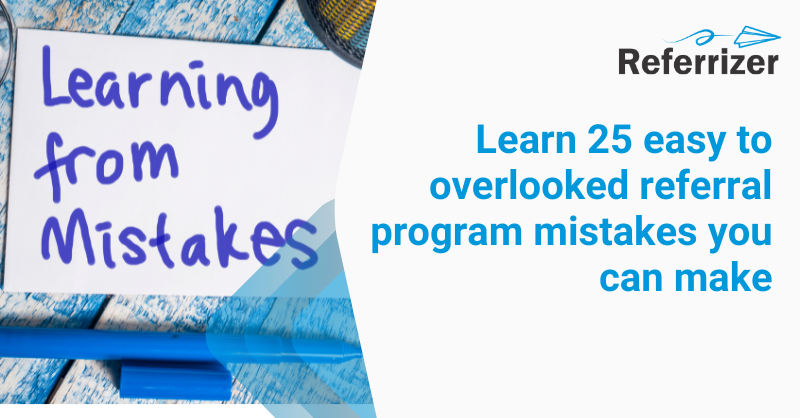
If you have happy existing customers who are pleased with your products and services, it is a good idea to ask them for a referral. The relationships you have with your customers can help you grow your customer base, since they can refer friends in their networks.
But just chatting to your customers about referring isn’t always enough. The setup and management of referral marketing campaigns usually entails a lot of moving parts, so there is a risk of referral programs failing. You must also work hard to ensure that you maintain the satisfaction of your current customers to continue and grow your business.
We’ve identified 25 common mistakes business owners and marketers commit in referral marketing, so you can plan your referral marketing strategy and avoid these failures.
Beginner Mistakes

1. Neglecting customer satisfaction
If you have a lackluster product or service at first, then there’s no way customers will refer you to their friends. Be sure you’re delivering services and products that exceed your customer’s expectations before asking for a customer referral.
2. Asking customers for referrals when they may not be ready to refer right away
There may be a hesitation from people to tell others about your company right away. You need to recognize when your customers will trust you enough to start recommending you to friends and family. Luckly, as a business owner you should know your customers well enough to decide on the right timing.
3. Assuming no customers means no referral marketing
There is no need to wait for a critical mass of customers before you begin focusing on referral marketing. You can scale your word-of-mouth marketing alongside your other channels such as paid ads and influencer marketing as your company grows.
4. Targeting the wrong customers
Boosting referrals will be difficult for brands that have not connected with their customers. To find the right audience for your company, look through your sales data and social media channels.
5. Referrals don’t know where to take the next steps
You shouldn’t leave too much to chance when attempting to reach new customers. Going from a word-of-mouth referral to a confusing or overly detailed referral page can discourage a friend from going through a referral.
Launch Mistakes

6. Set and forget
When you launch a referral program, you can’t simply forget about it. Especially in the early stages, it’s important to keep track and if needed redesign, evaluate, and reassess it on a regular basis.
7. Zero personalization
A personalized referral is just as important as an invitation to join. If a customer feels that they are not treated as a person but as simply a number, they will not join your program.
8. Not choosing the right type of promotions
If your business is one in which customer privacy is key, customers revealing their referral links on social media will cause problems. Referral cards and emails may be more appropriate alternatives.
9. You still have not figured out the best strategy
There is no shortcut to success when it comes to referrals. If it remains stagnant, consider changing your goals or incentives after giving your program some time to become adjusted.
10. You're not patient enough
As soon as your referral campaign fails to generate the millions you had hoped for, you give up. To be successful, you must reevaluate your campaign regularly and refuse to give up on your referral marketing.
Referral Marketing Mistakes

11. It’s hard to find
The importance of maintaining a visible referral program on your website, social media pages, email newsletters, and even in your brick-and-mortar location cannot be overstated. Getting the program out in front of the customer will likely get them to notice it and investigate it.
12. The registration process is complex
Signing up for your referral program may be too confusing for customers. Make sure that signup is frictionless and access to referral incentives is straightforward.
13. Your customers have a difficult time navigating through your referral webpage
You don’t have to go for a fancy design for your referral program’s webpage, but you do have to make it meaningful for your customers and easy for them to navigate. A customer may otherwise reconsider joining the program as a result of this.
14. Your website hides the CTA (call-to-action)
If you hide your call-to-action on your website, customers are less likely to interact with it. Make sure your website includes a basic call-to-action that directs the audience to the right place where they can join your referral program.
15. Your content is hard to understand
Customers should not be forced to read long blocks of text if you want them to recommend your products. The average person looks at a website’s written content for 5.59 seconds, so you only have a few seconds to tell your customers what your referral program is all about.
Promotional Mistakes

16. There is no invitation to customers
If customers don’t know your program exists, how will they learn about it? Do not forget to personally ask your customers for referrals, and to encourage them to endorse your business by using word-of-mouth marketing.
17. The way you ask customers to start referring
Getting clients to join your referral program won’t work if you come across as desperate. This will seem insincere and will make your customers feel uncomfortable.
18. Referrers haven't heard from you enough
Don’t forget to continue to engage your referrers, or you otherwise let them flail in the wind. However, don’t go too far either or you’ll annoy them, which could result in no reads, deletions, and unsubscribes.
19. You have failed to get feedback from customers
Seeing low levels of engagement may lead you to reach out to customers in order to learn why. Using this valuable information is one method of transforming a referral program.
20. You don't say "thank you" to your referrals
Send a personal thank you message or call the customer if they take the time to make a referral. It is increasingly important to show people you care by offering them simple courtesies.
Incentive Mistakes

21. There is no reward for the referral
Referral programs that reward the referrer while offering no incentive to the referral usually fail before they get off the ground. By offering rewards to successful referrals as well, you will add an extra incentive to encourage them to try out your business.
22. You only offer irrelevant rewards
Imagine you have referred your friends to a company and are excited about getting a unique incentive only to be offered a low-quality branded pen or mug as a thank-you for your referrals. To generate excitement about referral marketing, you should offer a range of rewards to your customers, from cash rewards to gift cards to discounts.
23. The incentive structure is confusing
If you can’t explain your referral incentives to a five-year-old, then it is too complex. Referral programs must be simple for customers: This makes it easier for them to figure out what rewards they will earn so that they are more inclined to refer their friends.
24. You don’t know how many incentives you gave out
If everything is going well and your customers are happy with your incentives, then you need to know how to track the overall performance. Getting the best results from your referral program requires that you track referrals and review key metrics.
25. You use a spreadsheet for tracking
Thanks to software that makes setting up referral programs easy, you don’t have to manually enter referrals into a spreadsheet. You can track referral incentives, measure performance, and track referral incentives all in one dashboard.
Bottom line?
Referral programs are excellent strategies for rewarding current customers and gaining new ones. When launching a referral program, companies expect hundreds of new customers right away.
However, it’s best to focus on creating a well-run, referral program that gets customers excited with relevant incentives and meaningful appreciation from the company. With some testing and patience, your referral program can get off to a good start.
















No comment yet, add your voice below!